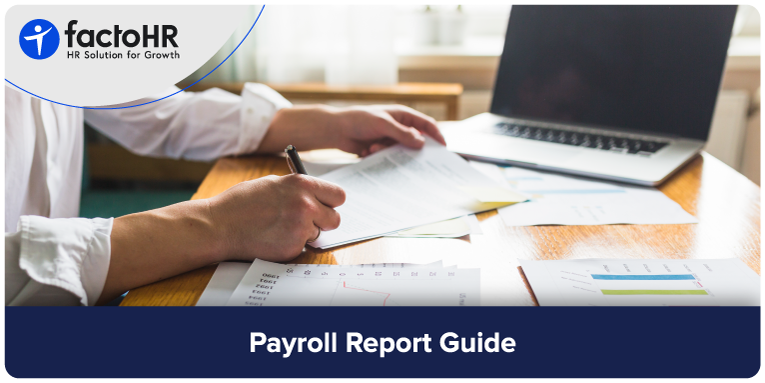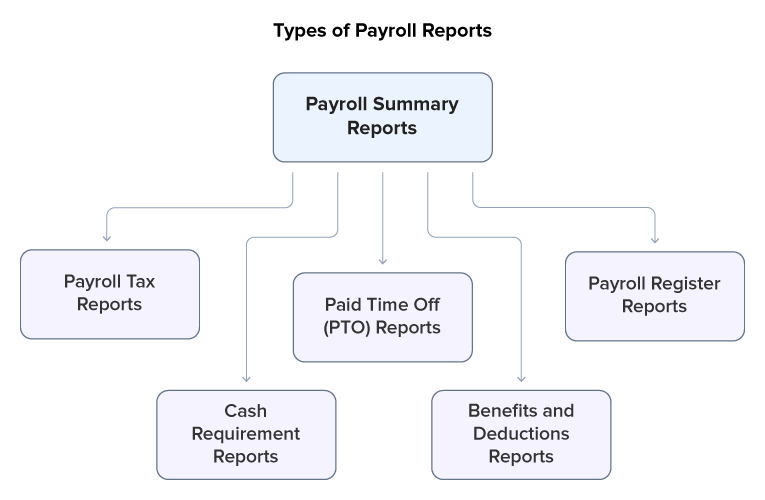What is a Payroll Report? Types & Compliance Guide for 2026

Table of Contents
Payroll reports serve as a foundation for ensuring accurate wages, payroll compliance with regulations, and informed business decisions. They keep careful records of the money employees receive as salary, what is deducted, the tax paid, and any grants they receive, so payment is in line with agreements and regulations.
As regulatory rules become more complex, payroll reports help demonstrate that companies are adhering to labor laws, tax codes, and industry-specific regulations. Payroll reports also help identify labor costs, workforce trends, and inform future financial plans.
Organizations use data analysis to determine how to allocate their budget, utilize their resources effectively, and drive growth. Selecting effective payroll reporting tools plays a crucial role in maintaining organizational stability and fostering growth. This article examines payroll reports, their various types, and the process of preparing them.

What is a Payroll Report?
A payroll report is a document that summarizes the payroll activities of any business for a specific period. This payroll summary report includes employee wages, deductions, and employer tax contributions.
Therefore, employee payroll reporting becomes essential for businesses seeking to track payroll costs, comply with tax regulations, and maintain effective cash flow management. You can also include employer payroll responsibilities, such as their names, employee IDs, and total hours worked, in the report.
A payroll report serves not only to track expenses but also to maintain transparency with your employees.
Why is an Accurate Payroll Report Essential?
Maintaining accurate payroll reports helps organizations ensure operational efficiency, compliance, and employee satisfaction. They are also critical for effectively managing employer payroll responsibilities and compensation data.
Ensures Compliance with Labor and Tax Laws
Accurate employee payroll reporting is crucial for ensuring statutory compliance. It ensures adherence to current labor laws and tax reporting obligations. Additionally, payroll reporting also ensures that your organization is protected from legal risk.
Especially when there is a growing demand for pay transparency laws across many regions, including the US, it becomes crucial to maintain compliance through accurate payroll reports.
Reduces the Risk of Penalties
Errors in payroll records may result in hefty fines, an audit, or a damaged reputation. Strengthening payroll processes allows organizations to stop common payroll errors and avoid financial penalties. Precise payroll records enable firms to resolve any disputes and avoid potential penalties.
Enhances Financial Planning and Cash Flow Management
Having payroll reports makes it simple to view labor expenses, which in turn facilitates budget planning and cash flow control. Working with accurate payroll reports can enable companies to track their staff’s compensation, perform payroll cost analysis, identify unnecessary expenses, and utilize resources effectively.
Promotes Employee Satisfaction and Retention
Employees use payroll reports to verify the details of their salary, including payroll deductions and the amount they retain. Because the payroll is accurate and the reports are detailed, employees are aware of their earnings.
Such reports help ensure invoices are as accurate as possible. Regular and precise payroll processing enhances employee satisfaction, team morale, and overall performance. This is especially important when global workforce participation is just 61% and with better payroll reporting, employee satisfaction will be higher, boosting participation.

What are the Types of Payroll Reports?
Being familiar with various types of payroll reports makes it easier to prepare taxes, stay compliant, and manage finances effectively. Such reports display the wages and benefits being provided, facilitating the smooth and timely processing of payroll.

Payroll Tax Reports
These reports are necessary for taxation, outlining the amount of tax owed at the federal, state, and local levels, to ensure compliance with the rules and the proper filing of payroll tax forms, such as Form 941 and W-2.
Payroll Register Reports
Information on each employee’s compensation during the pay period, including hours, money earned (gross), deductions, and net pay.
Paid Time Off (PTO) Reports
PTO reports track earned, used, and remaining leave balances, supporting time-off management and workforce planning.
Benefits and Deductions Reports
These reports outline voluntary and statutory deductions along with employer contributions, which are essential for benefits administration and audit readiness.
Cash Requirement Reports
These reports forecast the total cash needed to meet payroll obligations, aiding in cash flow planning and ensuring timely salary disbursement.
How to Use Payroll Reports in Your Organization
Successful payroll reporting is crucial for ensuring that financial goals align with effective workforce management. Utilizing these reports in a planned manner provides valuable compensation information and supports data-driven decisions across all areas of the organization.
Compliance and Tax Filing
Payroll reports help ensure payroll compliance by accurately tracking employee earnings, deductions, and tax withholdings. Use payroll reports to identify the key aspects of pay for each individual and ensure compliance with relevant laws and regulations.
Financial Planning and Budgeting
By leveraging compensation data and payroll trends, organizations can enhance financial forecasting and optimize ROI through payroll software solutions. Analyze cost reports to measure employees’ overall pay, their extra hours, and the benefits they get. It will let you estimate future payroll requirements and manage the budget as needed.
Employee Management and Satisfaction
Accurate employee payroll reporting supports timely payments, transparency, and trust. Communicate transparent, detailed payroll sheets that offer employee transparency on what they are paid, what is deducted, and a tax breakdown. It also allows employees to raise issues if there are discrepancies in salary components before payment is made.
Internal Audits and Record-Keeping
Comprehensive payroll records streamline internal audits, support the payroll audit process, and ensure readiness for compliance checks. Regular payroll reconciliation helps verify employee data, wage calculations, and taxation. They also enable better workforce analytics for strategic HR planning. Conducting routine audits can help verify employee data, wage calculations, and taxation efficiently.

The Payroll Reporting Process: Step-by-Step
The payroll reporting process involves several steps to ensure that employees receive accurate payments and that all records are properly maintained. Here are the steps explained for the payroll reporting process,
Determine the Reporting Period (E.g., Weekly, Monthly, Quarterly)
Choose the best payroll software that suits your organizational needs. Consider factors like budget, scalability, and integration capabilities with existing systems.
Identify Required Data
Collect employee data and maintain up-to-date information, including tax forms, bank details, and contracts.
Generate Reports
Create a detailed payroll report that summarizes everything from employee earnings, deductions, and net pay for the reporting period.
Analyze and Review
Review reports for accuracy and completeness. Managers or HR personnel should verify calculations and resolve discrepancies before payment is made.
Take Action
Disburse net pay to employees via direct deposit, checks, or pay card. Issue payslips and ensure employees have access to their payment details, and file statutory reports and deposit all deducted taxes and contributions with the relevant authorities
Conclusion
Accurate and timely payroll reporting ensures that employee payments are correct, the company remains compliant with regulations, and important information is readily available for future planning and decision-making. Dealing with complex compliance rules and being efficient requires organizations to use modern, proactive approaches in payroll, including payroll data security measures.
factoHR includes a comprehensive payroll system that addresses these needs. Automating tasks, integrating HR and payroll, enabling real-time payroll reporting, and ensuring full compliance are among the features that factoHR offers, which quicken and make payroll more accurate. Having a user-friendly system and strong analytics enables businesses to make informed decisions and encourages everyone to be accountable.
The integration of factoHR into payroll enables businesses to shift a regular administrative task into a key strategic area that supports their growth and future success. Schedule a demo now for advanced payroll reporting.

FAQs
How do Payroll Reports Help with Compliance and Tax Filing?
The payroll report is critical for computing the wages payable to employees, the amounts of taxes to be paid, and the employer’s contribution. They assist in preventing mistakes during tax filing and ensuring adherence to labor laws.
What are Payroll Best Practices for Accurate Reporting?
Best practices involve maintaining current and accurate payroll records, timely checking and reconciling reports, and automating calculations with payroll software. It is also essential to stay up-to-date with tax regulations.
What are Common Payroll Mistakes, and how Can They be Avoided?
The common mistakes include misclassifying employees, maintaining inaccurate records, missing tax deadlines, and poorly managing overtime compensation.
How does Payroll Software Automate Payroll Reporting?
Payroll software automates the calculation and deduction of payroll, as well as the generation of tax returns, ensuring they are filed accurately and on time.
What are Statutory Payroll Tax Forms, and how are They Used?
Statutory payroll tax forms are mandatory documents that employers must complete to report employee earnings, tax withholdings, and contributions. After filling out these forms, employers submit them to comply with tax regulations and pay the required taxes.
Grow your business with factoHR today
Focus on the significant decision-making tasks, transfer all your common repetitive HR tasks to factoHR and see the things falling into their place.

© 2026 Copyright factoHR


